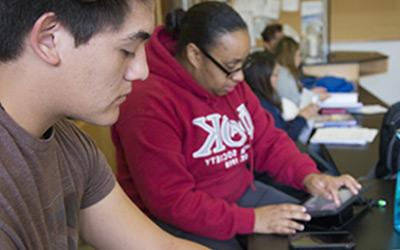Associate of Arts: General Studies
The AA in General Studies degree is designed for students planning to transfer to a college or university and requires a minimum of 60 credit hours. All courses included in the degree must be completed with a grade of "C" or better. A minimum of 35 of these credit hours must be completed in the Arizona General Education Curriculum (AGEC-A). The remaining degree requirements are comprised of 25 credit hours or more in the student’s elected program of study. Courses numbered 100 or above (excluding MAT 121, MAT 122, and ENG 100) which transfer as equivalent, departmental elective credit (DEC), or general elective credit (E) will be counted toward this degree. Special Topics and Experimental courses will not be counted toward this degree. Courses taken for S/U credit will not be counted toward this degree.

Minimum Credits Required: 60
Catalog
Degree Information
What courses will I need to take?
Degree information - If nothing is displaying, check if Javascript is enabled
What will I learn?
The outcomes identified below define the knowledge and skill sets that General Education graduates will possess at the end of their program of study.
English:
- Use effective research strategies to find credible, relevant information.
- Use a writing process that includes pre-writing, drafting, revising, and editing strategies.
- Communicate effectively by using the best available means of persuading a specific audience in a specific situation.
- Articulate the complexity, commonality and diversity of human behavior with groups.
- Use technology to enhance communication.
- Increase literacy to or beyond the intended level of the course.
- Develop awareness of "text" as it exists within historical, political and cultural contexts, using literary and rhetorical analysis.
Mathematics:
- Apply mathematics in context using appropriate problem solving skills
- Choose and manipulate formulas
- Create and interpret graphical representation
- Perform operations on mathematical structures, which may include real, complex, matrix, function space
- Demonstrate an understanding of geometric concepts
- Apply and interpret limits and limit definitions
- Gain appreciation of the nature and uses of mathematics
- Communicate using the language of mathematics
Arts/Humanities:
- Apply critical thinking skills, incorporating evidence gathered in research and in class.
- Evaluate religious, philosophical and humanistic traditions.
- Demonstrate an appreciation of cultural diversity.
Social & Behavioral Sciences:
- Demonstrate critical thinking skills.
- Synthesize, evaluate, and analyze information from different sources.
- Relate and explain connections between past and present events and issues.
- Understand historical process and method.
- Understand and utilize relevant discipline theories.
- Understand the connection between politics, values/ethics, and society.
- Increase awareness of national and/or global issues.
- Understand the scientific method, the role of theory, and the use of data.
Physical & Biological Sciences:
- Demonstrate skills necessary to conduct scientific investigations.
- Demonstrate scientific literacy
- Demonstrate skills necessary to conduct scientific investigations.
- Demonstrate critical thinking and deductive reasoning.
- Demonstrate the ability to communicate effectively.
- Demonstrate the use and application of models in building a scientifically supported framework
For AGEC-A outcomes and General Education information and requirements visit the General Education page.
How will my course placement affect my course sequence?
Placement testing requirements can vary, please select the courses that are most appropriate for your skill level. For additional information view the
Course Placement page.
Tracks based on current degree minimum requirements for English and Math.
English/Reading
Track 1:
ENG 095
ENG 099 + RDG 099
ENG 101
ENG 102
Track 2:
ENG 095
RDG 099
ENG 101A (combines ENG 099 + ENG 101)
ENG 102
Math
Track 1:
MAT 088
MAT 091
MAT 097
MAT 142
Track 2:
MAT 088
MAT 091
MAT 140 (combines MAT 097 + MAT 142)
Work with an advisor to ensure completion of your pathway in a timely manner.


